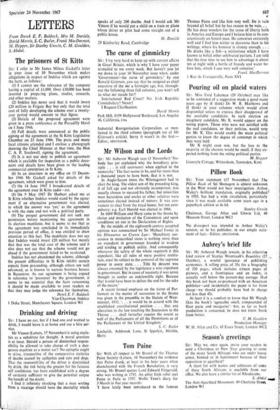Mr Wilson and the Lords
Sir: Mr Auberon Waugh says (3 November) 'No- body has yet explained why the hereditary prin- ciple . . . is still sacrosanct when applied to the monarchy.' The fact seems to be, and for more than a thousand years to have been, that it is not.
In Anglo-Saxon times the Witenagemot had to elect the king. The eldest son of the preceding king, if of full age and not obviously incompetent, was usually chosen to succeed his father, but minorities were hazardous and uncles or other relatives were sometimes elected instead of minors. It was con- venient to elect from the royal house, but not com- pulsory; e.g. Earl Harold was elected in 1066.
In 1689 William and Mary came to the throne by choice and invitation of the Convention and upon conditions set out in the Declaration of Rights.
By the middle of the eighteenth century accepted opinion was summarised by Sir Michael Foster in his Discourses on Crown Law: 'Hereditary suc- cession in monarchial states is nothing more than an expedient in government founded in wisdom and tending to publick utility. And consequently whenever the safety of the whole requireth it this expedient, like all rules of mere positive institu- tion, must be subject to the controul of the supreme power in every state. . . . Title by descent was always esteemed by the legislature a wise expedient in government. But in cases of necessity it was never thought to confer an indefensible right. Because that would have been to defeat the end for the sake of the means.'
A recent formal emphasis on the status of Par- liament in the matter of succession to the throne was given in the preamble to the Statute of West- minster, 1931. . . it would be in accord with the established constitutional position . . . that any alteration in the law touching the Succession to the Throne . . shall hereafter require the assent as well of the Parliaments of all the Dominions as of the Parliament of the United Kingdom.'
S. C. Butler Lochalsh, Ashbrook Lane, St Ippolyts, Hitchin, Herts














































 Previous page
Previous page